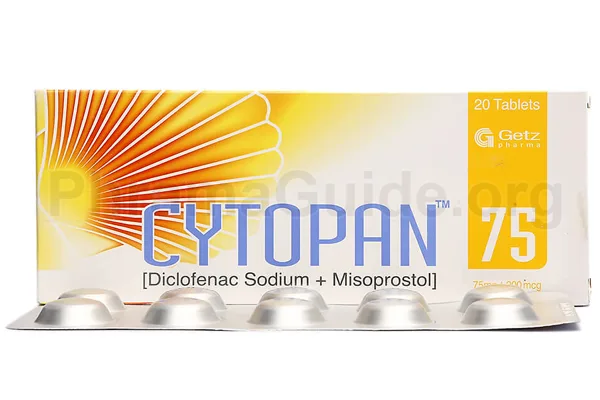Cytopan is s combination of diclofenac sodium and misoprostol and is typically used to prevent stomach ulcers in people who are at high risk for developing them due to chronic use of nonsteroidal anti-inflammatory drugs (NSAIDs) like diclofenac. Here are some common and less common side effects of Cytopan.
Common Side Effects
- Stomach upset or abdominal pain: Cytopan might include symptoms like indigestion, discomfort, or stomach cramps.
- Diarrhea: Some individuals may experience loose stools or increased bowel movements while taking Cytopan.
- Nausea or vomiting: Feeling sick to the stomach or vomiting can occur in some cases.
- Flatulence (gas): Increased gas production or passing of gas is a common side effect of Cytopan.
- Headache: Mild to moderate headaches might occur as a side effect of Cytopan.
Less Common Side Effects
- Severe abdominal pain: In some cases, individuals might experience intense or persistent abdominal pain that could indicate a more severe reaction while taking Cytopan.
- Gastrointestinal bleeding: Rarely, Cytopan can cause bleeding in the stomach or intestines, which may manifest as blood in the stool or vomit.
- Allergic reactions: Some people might experience allergic responses with Cytopan, such as rash, itching, hives, swelling of the face or throat, or difficulty breathing.
- Heart-related issues: In rare instances, there might be an increased risk of heart attack, stroke, or high blood pressure.
- Liver problems: Occasionally, Cytopan can affect liver function, leading to changes in liver enzymes or liver damage.

What is Cytopan?
Cytopan is one of the leading brands with a combination of Diclofenac Sodium and Misoprostol, manufactured and marketed by Getz Pharmaceuticals (Pvt) Ltd, Pakistan.
Cytopan : Available Formulations and Strengths
Presently, Cytopan is available in Tablet Form.
Cytopan Tablet : Diclofenac (Na) 50mg and Misoprostol 200mcg strengths
What Are The Possible Drug Interactions of Cytopan?
- Other NSAIDs (Nonsteroidal Anti-Inflammatory Drugs): Concurrent use of Cytopan with other NSAIDs can increase the risk of stomach irritation, ulcers, and bleeding.
- Anticoagulants and Antiplatelet drugs: Cytopan, combined with blood thinners like warfarin, aspirin, clopidogrel, or others may increase the risk of bleeding.
- Corticosteroids: Increased risk of gastrointestinal bleeding when taken Cytopan with corticosteroids.
- Selective Serotonin Reuptake Inhibitors (SSRIs) and Serotonin-Norepinephrine Reuptake Inhibitors (SNRIs): Concurrent use of Cytopan may increase the risk of gastrointestinal bleeding.
- ACE Inhibitors and Angiotensin II Receptor Blockers (ARBs): Cytopan may reduce the effectiveness of antihypertensive drugs when taken together.
- Lithium: Cytopan can increase lithium levels in the blood, potentially leading to toxicity.
- Methotrexate: Concurrent use of Cytopan can increase the risk of methotrexate-related side effects.
- Digoxin: Cytopan may increase the levels of digoxin in the blood, potentially leading to toxicity.
- Diuretics: Cytopan, in combination with diuretics might reduce their effectiveness and increase the risk of kidney problems.

Leave A Comment